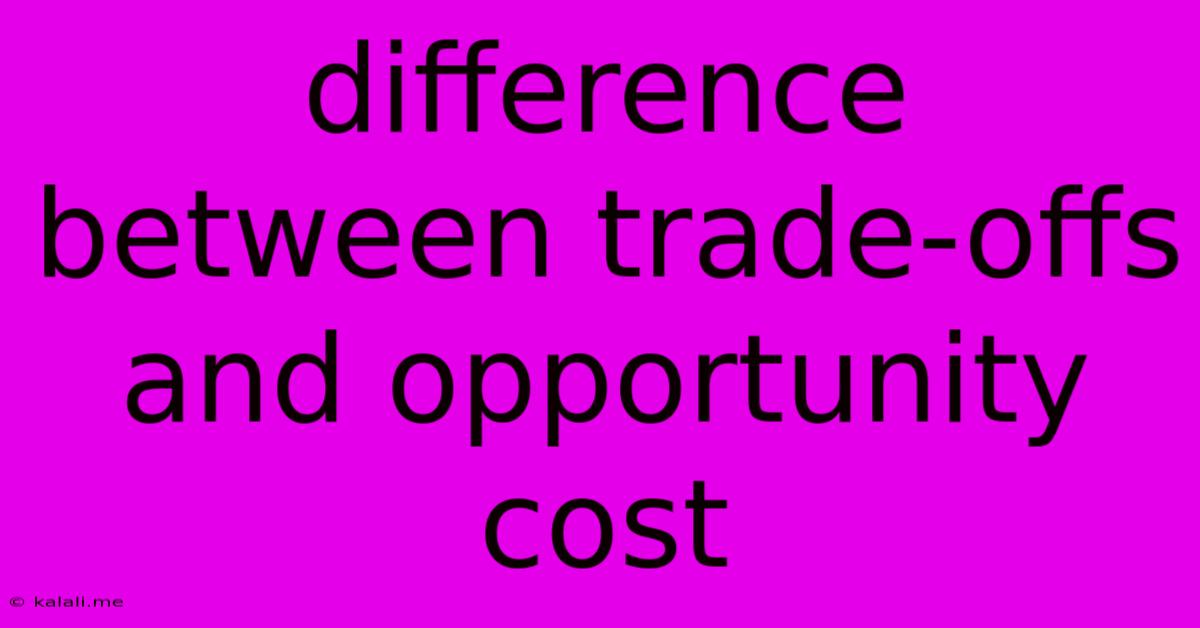Difference Between Trade-offs And Opportunity Cost
Kalali
Jun 13, 2025 · 3 min read

Table of Contents
Trade-offs vs. Opportunity Cost: Understanding the Difference
Understanding the concepts of trade-offs and opportunity cost is crucial for making sound economic decisions, whether in personal finance, business strategy, or public policy. While often used interchangeably, these terms represent distinct but related ideas. This article clarifies the difference between trade-offs and opportunity costs, providing practical examples to solidify your understanding. The core difference lies in their scope: trade-offs encompass a broader range of choices, while opportunity cost focuses specifically on the value of the best forgone alternative.
What is a Trade-off?
A trade-off involves choosing one option over another, acknowledging that each choice comes with both advantages and disadvantages. It's a conscious decision to prioritize certain aspects while sacrificing others. Trade-offs are inherent in almost every decision we make. They represent the compromises we accept to achieve our goals. The process often involves weighing the pros and cons of different alternatives to arrive at the most suitable option.
Examples of Trade-offs:
- Choosing a career path: A trade-off might involve choosing a high-paying job with long hours over a lower-paying job with better work-life balance. You're trading off time and personal life for financial security.
- Spending vs. saving: Deciding whether to buy a new car or save for a down payment on a house involves a trade-off between immediate gratification and long-term financial stability.
- Government budgeting: A government might face a trade-off between increasing military spending and funding social programs. Increased military spending might improve national security but reduce resources available for education or healthcare.
What is Opportunity Cost?
Opportunity cost is the value of the next best alternative forgone when making a decision. It's the potential benefit that you miss out on when choosing one option over another. While trade-offs acknowledge the existence of multiple options, opportunity cost specifically quantifies the value of the best option that was not chosen. It's not just about the sacrifices made; it's about the potential gains that were lost.
Examples of Opportunity Cost:
- Investing in stocks: If you invest $10,000 in stocks and they yield a 10% return, your opportunity cost is the potential return you could have earned from investing that same amount in bonds or real estate.
- Spending leisure time: If you spend your Saturday afternoon watching a movie, the opportunity cost is the value of the time you could have spent exercising, spending time with family, or working on a side project.
- Choosing a college major: The opportunity cost of choosing a particular major is the potential earnings and career opportunities you could have had by choosing a different major.
Key Differences Summarized:
| Feature | Trade-off | Opportunity Cost |
|---|---|---|
| Scope | Broader; involves multiple options & their pros/cons | Narrower; focuses on the best forgone alternative |
| Focus | The act of choosing between options | The value of the best option not chosen |
| Quantification | Qualitative; often involves subjective judgments | Quantitative; aims to measure the forgone value |
In Conclusion:
While related, trade-offs and opportunity costs are distinct concepts. Trade-offs represent the inherent compromises in decision-making, while opportunity cost specifically focuses on the value of the best alternative forgone. Understanding both concepts is crucial for making rational and informed decisions in all aspects of life. By carefully considering both the trade-offs involved and the potential opportunity cost, you can make choices that align more closely with your goals and priorities. This comprehensive understanding enables more effective decision-making across various domains, leading to improved outcomes.
Latest Posts
Latest Posts
-
What Are All The Multiples Of 7
Jun 14, 2025
-
What Is Square Root Of 61
Jun 14, 2025
-
What Do Plants Store Glucose As
Jun 14, 2025
-
Least Common Multiple Of 4 6 7
Jun 14, 2025
-
Emotional Intelligence Questions And Answers Pdf
Jun 14, 2025
Related Post
Thank you for visiting our website which covers about Difference Between Trade-offs And Opportunity Cost . We hope the information provided has been useful to you. Feel free to contact us if you have any questions or need further assistance. See you next time and don't miss to bookmark.